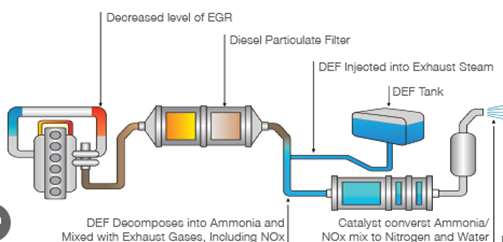
When considering modern diesel engines, acronyms like DEF have become important to conversations about emissions control. But, what is DEF? Specifically, Diesel Exhaust Fluid, or DEF, plays an important role in reducing harmful emissions and meeting environmental standards. In this blog, we'll simplify DEF by exploring what it is, how it works, and its importance in your diesel engine.
Who uses DEF?
Diesel Exhaust Fluid is found in vehicles that use a diesel engine. This makes it very common in industries such as trucking, construction, agriculture, and mining. Also, it is very important that owners of passenger vehicles that use diesel engines monitor their DEF levels just as they would their engine oil or windshield washer fluid. A usage rate of 1-2% of diesel fuel use is expected. Light duty vehicles and pickups fill their DEF tanks around their oil changes. This is around 5,000 to 7,000 miles. While commercial and off-highway equipment fill their tanks at every fuel stop.
What is DEF?
Diesel Exhaust Fluid is a mixture of 32.5% high purity synthetic urea and 67.5% deionized water that is used in Selective Catalytic Reduction(SCR) systems in diesel engines. DEF is the primary ingredient used to help convert NOx to harmless nitrogen and water. It is a stable, colorless, non-flammable, non-toxic and is classified as minimum risk for transportation.
The Working Mechanism of DEF
With the implementation of new EPA requirements, 2010 brought significant changes in the on-road diesel engine vehicle. Some vehicles attempted to use high levels of exhaust gas recirculation to reduce NOx emissions. Many vehicles began using SCR systems. Diesel exhaust fluid is injected into the exhaust stream just ahead of the SCR catalyst and converts NOx to harmless nitrogen and water. This greatly reduces NOx. This emission is a significant contributor to greenhouse gases in the air with overall reduction in total diesel emissions reduced by 90%.
- Introduction into the Exhaust Stream:
In vehicles equipped with Selective Catalytic Reduction (SCR) technology, Diesel Exhaust Fluid is injected into the exhaust stream. Specifically, this occurs downstream from the engine but before the catalytic converter.

- Ammonia Production:
When Diesel Exhaust Fluid is exposed to the high temperatures in the exhaust system, it undergoes thermal decomposition, breaking down into ammonia (NH₃) and carbon dioxide (CO₂).
- Ammonia's Role in Emissions Reduction:
The ammonia generated in this process is the key player in reducing nitrogen oxide (NOx) emissions. Specifically, It reacts with NOx in the presence of a catalyst, breaking it down into harmless nitrogen (N₂) and water vapor (H₂O).
- SCR Catalyst:
The SCR catalyst, often made of materials like titanium dioxide, facilitates the chemical reaction between ammonia and NOx. Therefore, This catalyst is a crucial component of the SCR system.
- Regulating Emissions:
By enabling the conversion of NOx into nitrogen and water, DEF helps diesel engines meet national emission standards, such as those set by the Environmental Protection Agency (EPA) and the European Union.
Key Takeaways
- Environmental Compliance:
- DEF empowers diesel engines to meet emission standards, promoting cleaner air and reducing environmental impact.
- SCR Technology:
- DEF's effectiveness is closely linked to SCR technology in diesel engines, a widely adopted system in various vehicles such as trucks, buses, and some passenger cars.
- Precise Composition:
- To ensure the SCR system's reliable and efficient operation, the specific composition of Diesel Exhaust Fluid, consisting of a urea and deionized water mixture, is crucial. It underscores the significance of sourcing DEF from reputable and trusted suppliers.
- User Responsibility:
- Vehicle owners play a vital role in maintaining Diesel Exhaust Fluid levels. Specifically, regularly replenishing DEF is a necessary task to ensure the SCR system performs its job effectively.
Conclusion
Understanding Diesel Exhaust Fluid goes beyond awareness of it's acronym. It's an important part of the effort to lower the environmental impact of diesel engines. As emissions standards continue to change, DEF is a testament to the industry's commitment to cleaner, more sustainable transportation. Therefore, looking towards the future, Diesel Exhaust Fluid is becoming more popular and it is important to understand what DEF is and how it works. Finally, for more information on DEF and emissions regulations visit the Government of Canada's website.
If you have any questions about what DEF is or how it works please call 1.800.463.0354 and speak to our Technical Specialist - Corey Foy.